|
|
|
Sort Order |
|
|
|
Items / Page
|
|
|
|
|
|
|
| Srl | Item |
| 1 |
ID:
174139
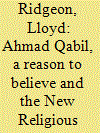

|
|
|
|
|
| Summary/Abstract |
Ahmad Qabil (d. 2012) was a mid-ranking seminarian who achieved considerable fame in Iran due to his foregrounding of reason in his jurisprudential writings, his opposition to both the strict ‘literalist’ version of sharica law propounded by the authorities in the Islamic Republic and the authoritarian regime of Ayatollah Khamenei, and for his 2004 fatwa which permitted women the choice about head covering (hijab). His commitment to reason and justice meant that his political and jurisprudential compositions and activities cannot be divorced from each other; rather, they developed in symbiotic fashion. Largely ignored by Western scholars, this article examines Qabil’s contribution to the so-called ‘New Religious Thinking’ movement in Iran. His writings and activities are significant because the reason-driven approach reflects an attempt to navigate a path based on sources within the Islamic jurisprudential tradition towards ‘universal’ standards that are common in the West, and thereby avoid the accusations of ‘cultural erosion’ through intellectual borrowing from the West.
|
|
|
|
|
|
|
|
|
|
|
|
|
|
|
|
| 2 |
ID:
168273
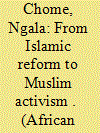

|
|
|
|
|
| Summary/Abstract |
This article traces the evolution of an Islamist ideology in Kenya’s public discourse, putting Islamist ideas within a longer history of Muslim politics than most other studies. Specifically, it examines internal debates amongst the minority Muslim population of Kenya, and debates between Muslims and the state and Muslims and the wider Christian public, regarding how to improve the Muslim condition in a Christian-dominated country. The immediate background for the emergence of Islamist ideas is then discussed through an examination of trends since the 1990s, including increased contestations of religious and political authority, and responses to Muslim activism by the state and the wider Christian public. The article concludes that Islamist politics in Kenya, and elsewhere, are more often than not a result of local histories as much as they are part of a global Muslim ‘victimization’ narrative.
|
|
|
|
|
|
|
|
|
|
|
|
|
|
|
|
| 3 |
ID:
099023
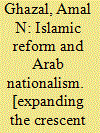

|
|
|
|
|
| Publication |
London, Routledge, 2010.
|
| Description |
xiv, 171p.
|
| Series |
Culture and civilization in the Middle East
|
| Standard Number |
9780415779807, hbk
|
|
|
|
|
|
|
|
|
|
|
|
Copies: C:1/I:0,R:0,Q:0
Circulation
| Accession# | Call# | Current Location | Status | Policy | Location |
| 055272 | 320.5409174927/GHA 055272 | Main | On Shelf | General | |
|
|
|
|
| 4 |
ID:
082161
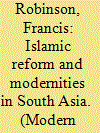

|
|
|
|
|
| Publication |
2008.
|
| Summary/Abstract |
From the beginning of the Islamic era, Muslim societies have experienced periods of renewal (tajdid). Since the eighteenth century, Muslim societies across the world have been subject to a prolonged and increasingly deeply felt process of renewal. This has been expressed in different ways in different contexts. Amongst political elites with immediate concerns to answer the challenges of the West, it has meant attempts to reshape Islamic knowledge and institutions in the light of Western models, a process described as Islamic modernism. Amongst 'ulama and sufis, whose social base might lie in urban, commercial or tribal communities, it has meant 'the reorganisation of communities . . . [or] the reform of individual behavior in terms of fundamental religious principles', a development known as reformism. These processes have been expressed in movements as different as the Iranian constitutional revolution, the jihads of West Africa, and the great drives to spread reformed Islamic knowledge in India and Indonesia. In the second half of the twentieth century, the process of renewal mutated to develop a new strand, which claimed that revelation had the right to control all human experiences and that state power must be sought to achieve this end. This is known to many as Islamic fundamentalism, but is usually better understood as Islamism. For the majority of Muslims today, Islamic renewal in some shape or other has helped to mould the inner and outer realities of their lives
|
|
|
|
|
|
|
|
|
|
|
|
|
|
|
|
| 5 |
ID:
145235
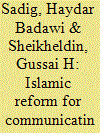

|
|
|
| 6 |
ID:
169121
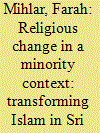

|
|
|
|
|
| Summary/Abstract |
Scholarly work exists on how Muslim minority positioning affects identity and politics, but what is less known is its impact on religion. Sri Lanka’s 9% Muslim population, the country’s second largest minority, has undergone a series of recent changes to religious identity, thinking and practice, which have been shaped by its relationship to the dominant and warring ‘ethnic others’. As Sri Lanka plunged deeper into armed conflict in the 1990s, Muslims experienced significant shifts in religious thinking and practice, identifying strictly with a more ‘authentic’ Islam. After the war ended in 2009, Muslims became the target of majoritarian Sinhala-Buddhist violence, resulting in a reinterpretation of Islam and a counter process of change. Using the Sri Lankan Muslim case study to engage with scholarly critiques of majority–minority binaries, this article analyses how religious change is brought about through the interjection of minority status with ethno-nationalisms and conflict. Its focus on Islam in Sri Lanka contributes to area studies and to Islamic studies, the latter through a rare analysis of Islamic reform in a Muslim minority context.
|
|
|
|
|
|
|
|
|
|
|
|
|
|
|
|
| 7 |
ID:
131476
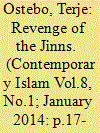

|
|
|
|
|
| Publication |
2014.
|
| Summary/Abstract |
The point of departure for this article is a story about jinns taking revenge upon people who have abandoned earlier religious practices. It is a powerful account of their attempt to free themselves from a past viewed as inhabited by evil forces and about the encounter between contemporary Salafi reformism and a presumed disappearing religious universe. It serves to prove how a novel version of Islam has superseded former practices; delegitimized and categorized as belonging to the past. The story is, however, also an important source and an interesting entry-point to examine the continued relevance of past practices within processes of reform. Analyzing the story about the jinns and the trajectory of Salafi reform in Bale, this contribution demonstrates how the past remains intersected with present reformism, and how both former practices and novel impetuses are reconfigured through this process. The article pays attention to the dialectics of negotiations inherent to processes of reform and points to the manner in which the involvement of a range of different actors produces idiosyncratic results. It challenges notions of contemporary Islamic reform as something linear and fixed and argues that such processes are multifaceted and open-ended.
|
|
|
|
|
|
|
|
|
|
|
|
|
|
|
|
| 8 |
ID:
087292
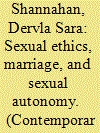

|
|
|
|
|
| Publication |
2009.
|
| Summary/Abstract |
Muslims today are increasingly re-examining gender and human rights in the light of Qur'anic teachings, and these issues crucially intersect in the terrain of sexual autonomy. The Qur'an insists that men and women are spiritually equal, yet dominant interpretations of sexual rights in Islam are not gender symmetrical. This paper asks whether Islam's depiction of sexuality and marriage allows a space for female, and non-heterosexual, sexual autonomy. It also explores current interpretations of Islam, sexuality and same-sex relationships amongst British Muslims who identify as Lesbian, Gay, Bisexual and Transgendered. Large issues are at stake for contemporary Muslims re-examining their institutions and identity. Does marriage remain authoritative when paradigms of sexuality shift, and what does this mean for sexual autonomy in the wider Muslim consciousness?
|
|
|
|
|
|
|
|
|
|
|
|
|
|
|
|
| 9 |
ID:
167965
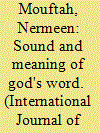

|
|
|
|
|
| Summary/Abstract |
For centuries Muslims have asked whether the Qurʾan should be recited and memorized first and foremost, or whether one must prioritize understanding the meaning of its complex language. What is the best way to encounter God's Word? To explore this question, a women's Qurʾan lesson in a slum of Old Cairo illustrates modern Muslim anxieties over the place of discursive meaning in encounters with the Qurʾan. This article elaborates the concept of affirmation as an analytic to grasp how the women relate to the truth of revelation. Affirmation is a performative and discursive hermeneutic practice that deploys Qurʾanic citation, situates Qurʾanic concepts in daily life, and sutures the efficacy of Qurʾan education with correct language and with right action. Their lessons are indicative of reformist trends in Qurʾan education that open onto questions of meaning and understanding in relation to human interactions with divine speech.
|
|
|
|
|
|
|
|
|
|
|
|
|
|
|
|
| 10 |
ID:
050639
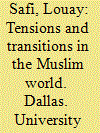

|
|
|
|
|
| Publication |
Dallas, University Press of America, 2003.
|
| Description |
xiii, 230p.
|
| Standard Number |
0761827226
|
|
|
|
|
|
|
|
|
|
|
|
Copies: C:1/I:0,R:0,Q:0
Circulation
| Accession# | Call# | Current Location | Status | Policy | Location |
| 047779 | 297.27/SAF 047779 | Main | On Shelf | General | |
|
|
|
|
|
|
|
|
|